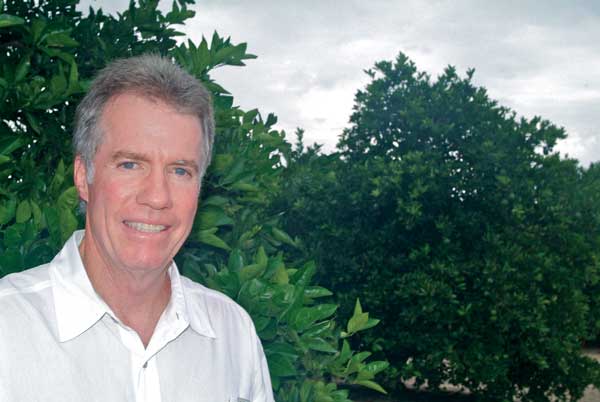September 6, 2011

Like many veteran Florida citrus growers, Ellis Hunt, Jr., vividly recalls picking oranges in his younger days. That job, of all those in his family’s groves, wore him out.
“Picking oranges made me go to college so I could be sure of doing something else in life. It’s a tough, hot, dirty job. It pays piece rate. You have to really work hard at it,” he says.
He thinks most U.S. citizens would also shy away from harvesting fruit. That’s why Florida’s legislative effort this year to pass an “Arizona-style” law cracking down on illegal immigrants concerns Hunt.
Though no such law went into effect in Florida this year, both Republican legislators and Gov. Rick Scott promise to revisit the idea in the next session.
“The plain and simple fact is, if it is passed and enforced, it will put agriculture out of business. Our fruit will be on the ground. Most growers of fruit and vegetables cannot stand to go a year without a harvest,” says Hunt, president of Hunt Bros., Inc., a Lake Wales-based grower with 5,000 acres of citrus as well as grove caretaking, harvesting, packing and marketing divisions.
He watched closely as similar laws passed this year in both Alabama and Georgia. “I heard that some blueberries and onions could not get harvested because labor was no longer available,” he says.
Among his other duties, Hunt oversees the business’ harvesting crews, so he knows first-hand the realities of getting fruit picked and marketed these days.
“I admire and respect fruit pickers. I make a point of saying hello to them every day, of thanking them and telling them I appreciate them and what they’re doing. They are equally as important as anybody in this organization,” Hunt says.
“When I was in high school back in the 1960’s, it was honorable and acceptable in society to pick oranges. Teenagers here would do it to make money to pay for the prom or homecoming or gas for a weekend date.
“I think it’s still an honorable profession, but young people won’t do it anymore. They’re interested in other things. We just can’t get U.S. citizens to pick. We’d be happy to put them to work in the grove, if they would do it. We rely on our Hispanic crews.”
Hunt thinks neither the U.S. Department of Labor’s H-2A worker program nor the proposed federal E-Verify program, which would require employers to check workers’ legal status, can be useful for most growers.
The U.S. House of Representatives Judiciary Committee is expected to soon consider an E-Verify bill, H.R.2164, called the Legal Workforce Act, introduced by the committee’s chair, Lamar Smith (R-TX). Smith calls it, “a bill that could open up millions of jobs for unemployed Americans and legal immigrants.” Agriculture groups across the nation generally oppose the measure.
“If they said E-Verify was mandatory, that would put a lot of growers out in one season,” Hunt says. “Most farmers cannot stand to plant and grow a crop and then lose it. One season and they’d be gone forever.
“And, H-2A is cumbersome, slow, costly and full of government bureaucracy. Bureaucracy is as dangerous to us as citrus greening disease, which is the most serious disease we have. It can put us out of business, if we’re not careful.”
Hunt’s family is legendary in the citrus business. Deeley Hunt, his grandfather, and his great-uncle Charles founded the company in 1922 and built a fresh fruit packing house in 1929. Deeley bought out his brother in 1938 and became an industry powerhouse.
He was one of six founders of Florida Citrus Canners Cooperative, now known as Florida’s Natural. In addition, he was a leader of Citrus World, one of the first directors of Florida Citrus Mutual, and on the board of Seald Sweet Growers. Deeley Hunt died in 1984 and in 1989 was inducted into the Florida Citrus Hall of Fame.
In the 1950’s, Deeley Hunt’s sons, Frank and Ellis Hunt, Sr., joined the company and, in the 1980s led expansion southward to LaBelle and Immokalee, which saved the business after a devastating 1989 freeze destroyed 75 percent of their fruit in the Lake Wales area.
During the 1970s, Ellis Hunt, Jr., his brother, Deeley, and his cousin, Frank III, joined the family business, eventually dividing responsibilities according to their personal talents and interests.
With that kind of investment of time, money and energy, Ellis Hunt, Jr., wants to be certain the company’s future remains solid.
“A lot of people don’t understand what it takes to harvest a crop and don’t understand that the way our society has gone, most U.S. citizens are not going to do that kind of work.
“Our industry needs to be sure legislators in Washington and Tallahassee are well-grounded in what it takes for us to do business,” says Hunt, recently appointed by the governor to the Florida Citrus Commission board of directors.
About the Author(s)
You May Also Like




